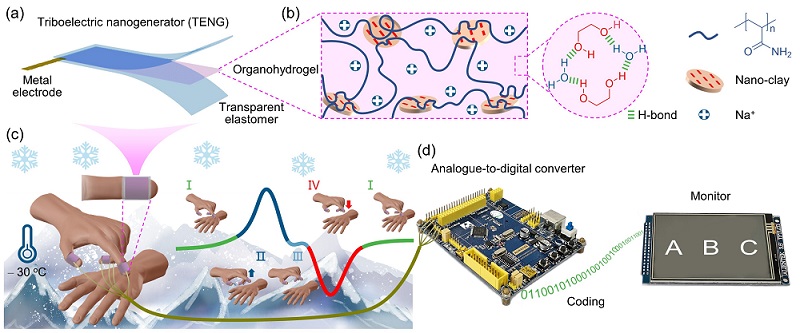
Researchers led by Prof. CHEN Tao at the Ningbo Institute of Materials Technology and Engineering (NIMTE) of the Chinese Academy of Sciences (CAS) have developed an anti-freezing organohydrogel, which was applied as electrodes to prepare triboelectric nanogenerators (TENGs), realizing high-efficiency human-machine interaction at -30 ℃. Results were published in Nano Energy.
Human-machine interaction plays an increasingly crucial role in the fields of mobile communications, Internet of Things intelligent medical care, and intelligent robots. As a promising candidate to prepare next-generation flexible human-machine interactive devices, polymer gels have drawn great attention from researchers. However, devices based on the conventional polymer gels turn brittle with poor ionic conductivity at temperature below zero, restricting their practical applications.
In nature, many creatures can survive under extremely cold environments by preventing the ice crystals from forming in cells. Inspired by anti-freezing organisms such as tree frogs, researchers at NIMTE developed an anti-freezing organohydrogel consisting of polyacrylamides/nano-clays networks absorbed with ethylene glycol (EG)/water.
Through solvent replacement of a hydrogel in EG/water binary solvent, the organohydrogel was prepared. Benefiting from the anti-freezing property of EG/water binary solvent, the organohydrogel showed excellent conductivity, stretchability, transparency and healing efficiency at -30 ℃.
In addition, the organohydrogel was used as electrodes to prepare organohydrogel TENGs. Five TENGs were further attached on fingers as self-powered sensors to achieve a human-machine interactive keyboard.
The voltage signals generated by the keyboard when in contact with surfaces were collected, coded, and then interpreted into letters and punctuations for display on a monitor. By virtue of this self-powered flexible keyboard, the typing was demonstrated successfully at -30 ℃.
The study sheds light on the development of anti-freezing soft materials, self-powered sensors, and wearable human-machine interactive device systems in the fields of polar scientific research and intelligent robots.
This work was supported by the National Natural Science Foundation of China, the Key Research Program of Frontier Sciences of CAS, the Zhejiang Provincial Natural Science Foundation of China, and the Ningbo Scientific and Technological Innovation 2025 Major Project, among others.

Design of organohydrogel TENGs to achieve human-machine interactive keyboards. (Image by NIMTE)

86-10-68597521 (day)
86-10-68597289 (night)

52 Sanlihe Rd., Xicheng District,
Beijing, China (100864)

